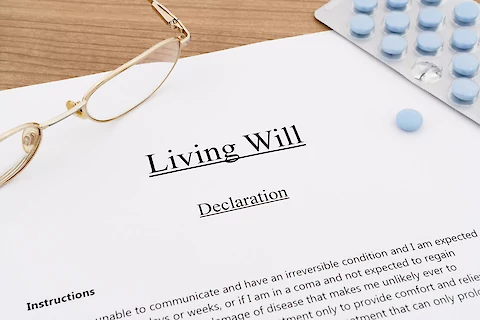
Navigating the intricacies of estate planning can be intimidating, especially when unfamiliar terms like "living "are thrown into the mix. For seniors embarking on this journey of future planning, understanding such terms is essential.
This blog post is designed specifically for you, offering clarity on what a living will is, why it's important, and how it fits into the broader context of estate planning. Our goal is to ease your worries and equip you with the knowledge you need to make informed decisions about your future.
What Is a Living Will?
A living will, also known as an advance healthcare directive, is a state-specific legal document that outlines your preferences for medical treatment if you become unable to communicate or make decisions for yourself. Consider it as a roadmap, guiding doctors and loved ones about your healthcare choices when you can't.
There is a distinct difference between a living will and a standard will: while a standard will deals with the distribution of assets after someone's death, a living will deals with healthcare decisions while the person is still alive but incapacitated.
What Does a Living Will Include?
Typically, a living will lays out your wishes regarding life-sustaining treatments, such as artificial nutrition and hydration, dialysis, resuscitation, and mechanical ventilation. It allows you to decide in advance whether you want these treatments applied, limited, or withheld in certain situations. It guides healthcare professionals and eases the decision-making burden on loved ones during a critical and emotionally charged time.
What Doesn't a Living Will Include?
It's important to note that a living will doesn't cover all aspects of your future. For instance, it does not dictate the management of your assets or financial affairs, which is handled by a traditional will or other estate planning documents. A living will also doesn't include funeral plans or wishes regarding the disposition of your remains.
Other Important Medical Documents for Seniors
Beyond a living will, other medical documents can contribute to comprehensive estate planning.
- A Durable Power of Attorney for Health Care lets you designate a trusted person to make medical decisions for you if you become unable to do so.
- A Do Not Resuscitate (DNR) order is a directive to medical professionals not to perform CPR if you stop breathing or your heart stops beating.
- A HIPAA release allows designated individuals to access your medical records. Each document serves a specific purpose and works alongside your living will to ensure your wishes are respected.
Many of these forms or templates are available online.
Tips for Creating a Living Will
Creating a living will is a delicate task that you should approach with care. It's a good idea to seek professional legal advice to ensure your document is legal, clear, and comprehensive. Discuss your choices with your loved ones to avoid any confusion or misunderstanding down the line. It's also important to review and update your living will regularly, especially after significant life changes, such as a medical diagnosis or changes in your family.
Live Your Best Life With Senior Helpers
Understanding and creating a living will can significantly reduce uncertainty and stress about your future medical care. It's an essential part of your estate planning toolkit, along with other medical and financial documents. With this knowledge in hand, you're well on your way to crafting a comprehensive plan that reflects your desires and protects your interests.
Another aspect of advance planning is choosing in-home care. Senior Helpers Lehigh Valley is here to help. We invite seniors in Allentown, Bethlehem, Nazareth, Whitehall, and Schnecksville to contact us today to learn more about our friendly, comprehensive services that prolong independence and quality of life.